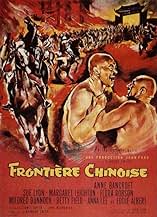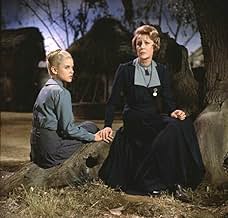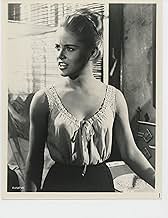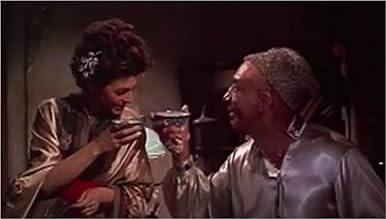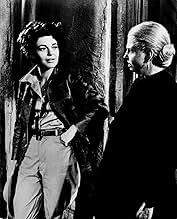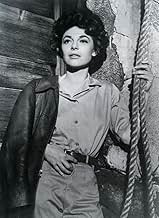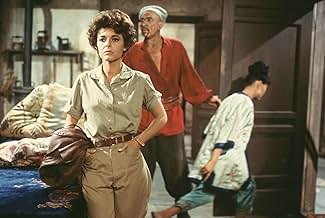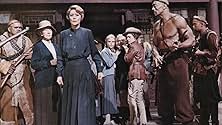VALUTAZIONE IMDb
6,7/10
2873
LA TUA VALUTAZIONE
Nella Cina del 1935, sette devote missionarie cercano di proteggersi dalle avances di un barbaro signore della guerra mongolo e della sua spietata banda di guerrieri.Nella Cina del 1935, sette devote missionarie cercano di proteggersi dalle avances di un barbaro signore della guerra mongolo e della sua spietata banda di guerrieri.Nella Cina del 1935, sette devote missionarie cercano di proteggersi dalle avances di un barbaro signore della guerra mongolo e della sua spietata banda di guerrieri.
- Regia
- Sceneggiatura
- Star
- Premi
- 1 candidatura in totale
Lee Kolima
- Warrior
- (non citato nei titoli originali)
Recensioni in evidenza
For a film nut like me. 7 Women offers a plethora of pleasures. Patricia Neal was suppose to star but ill health made her unavailable. Anne Bancroft took over as the drinking, smoking, swearing saint. and all the aspects of this complex character are totally real in Anne Bancroft's face. She arrives to the Mission in China like a benevolent tornado. The spectacular Margaret Leighton is the head of the Mission and she plays it like a raw nerve, Among the other women, Flora Robson, Queen Elizabeth to Laurence Olivier's Michael Ingolby in Fire Over England, brings a voice of reason that reassure us, Betty Field , Kim Novak's mother in Picnic, among a gallery of memorable characters, plays the pregnant middle age woman who offends the Christian mission for having had sex with her husband under their roof. Mildred Dunnock, Anna Lee and even Stanley Kubrick's Lolita, Sue Lyon is part of the Mission. On the other side, the villains, that offended so many people, John Ford casts his longtime companion Woody Strode. I understand and even accept all the criticisms listed in the reviews of this pages but, somehow, I can put all that aside and enjoy the plethora of pleasures that it offers.
"Seven Women" is the last feature film of John Ford, arguably the greatest director the United States has yet produced. After a half century of film making, Ford ended his fabled career with a wide screen feature about women in peril at a Chinese mission. Infirm and alcoholic, he filmed it on an MGM sound stage; MGM then cut it and tossed it away on the bottom half of a double bill.
Today, the film is little known and seldom seen. It is far from Ford's best work, yet there is power and believability in many of the lead performances, and power in the arc of the story. Anne Bancroft shines as a feisty New York doctor who ultimately sacrifices herself to save the other missionaries -- many whom she doesn't agree with -- from brutal deaths at the hands of Chinese bandits. Her work here is more forceful and better realized than her role of Mrs. Robinson, done two years later.
The best gift MGM/Sony could give lovers of serious cinema is a clean print of this forgotten film. Its sets are often glaringly artificial, and some of the secondary players are over the top (an old weakness of Ford's) as well as miscast, but "7W" is a far better film than Hollywood legend has told us.
Today, the film is little known and seldom seen. It is far from Ford's best work, yet there is power and believability in many of the lead performances, and power in the arc of the story. Anne Bancroft shines as a feisty New York doctor who ultimately sacrifices herself to save the other missionaries -- many whom she doesn't agree with -- from brutal deaths at the hands of Chinese bandits. Her work here is more forceful and better realized than her role of Mrs. Robinson, done two years later.
The best gift MGM/Sony could give lovers of serious cinema is a clean print of this forgotten film. Its sets are often glaringly artificial, and some of the secondary players are over the top (an old weakness of Ford's) as well as miscast, but "7W" is a far better film than Hollywood legend has told us.
Finished in 1965 and belatedly released a year later, 7 Women represents director John Ford's final bow on the silver screen after a long and extremely significant foray into the world of celluloid. Existing as something of an atypical swan song for the long renowned film-maker, the feature is one that suffers from an overall lack of ideas, but which also pulls this weakness to be its central force of power. Employing a recurring theme of empowerment in the face of defeat and a defiance of authority, blind-faith and outdated ideals, 7 women is at its heart, sixties film-making at its most empowering and critical. It may not be as elegant as other works of the decade, nor as moving, but blessed with a wonderful sense of character and performance, John Ford achieves one of his most significant works here with a piece of film that all things considered, should never be as such.
I say this, mainly, because 7 Women is something of a canned movie. In this vein, the feature, like a few of Ford's previous efforts, feels like a play rather than a movie. Through this minimalist tone, Ford strikes a stern focus on character and theme, rather than obtuse action or plot—two elements which could have easily been given the spotlight by any other film-maker had they chosen to. You see, telling the story of a small missionary camp set up in a civil-war-torn China during the late thirties, 7 Women finds its roots in theatre drama, yet also mixes an element of danger into the mix too, outside of any inherent character conflict (though, one could argue such plot devices are perfunctory and only serve merely as a catalyst to explore these characters more effectively). Under the attack of a rogue gang of savage bandits known for their pillaging, torture, rape and murder of several nearby missionary outposts, Ford attempts to bring out the absolute base levels of his characters—to put them under the microscope to see who they really are. The results are interesting, albeit predictable, yet the overall experience boils down to one of subtle reflection.
As mentioned above, and indeed more than made obvious by the movie's title, key to this somewhat somber approach is in the screenplay's devotion to character rather than plot; and what a character we have here. While ostensibly telling the story of the seven women staffed by the Catholic Church to help deliver these poor souls, the central point of Ford's story here instead chooses to focus on the black sheep of the bunch, Dr. Cartwright. Cartwright, played by an endlessly captivating Anne Bancroft, is a last-resort chain-smoking, binge-drinking, foul mouthed, pant-wearing doctor who would rather talk to the bottom of her glass than to the higher being in the sky everyone else around her seems content to confide in. Straight away Ford plays her as being as the misfit malcontent that she obviously would be in this situation, yet he does well to establish her as anything but incompetent with her duties. Following this theme through right to the movie's finest point (the very last scene which in itself is worth the ninety minutes that precede it), Dr. Cartwright ends up stealing the show at every turn—sure, there are ideas here about humanitarian needs outweighing those of a clergy (most of which are needlessly heavy-handed and all too frequent with no real penetration involved), and there are more than a few other interesting characters here, but for the most part 7 Women is much more the story of 1 Woman, and well, that's probably for the best.
This isn't to say that there's not much to see outside of this wonderful pairing of Ford and Bancroft; it's just that this will be what you no doubt will take away from the feature as being its most enjoyable aspect. And with that said, it's important to stress that while 7 Women may not be as wholly enjoyable or entertaining or indeed significant as some of Ford's previous work, it nevertheless manages to stand on its own two feet—much like our beloved Cartwright—without pandering to expectations either of its audience or of its society at the time. Much like many films of the sixties, 7 Women is a daring and often compelling look at ourselves, whether through our hopes and dreams, our loves and faiths or our demons and tragedies. Not only that but it's the final statement of a director that gave cinema many of its greatest hours, and in that vein, 7 Women gains some significance without ever sacrificing its distinctly restrained and quietly contemplative mood.
I say this, mainly, because 7 Women is something of a canned movie. In this vein, the feature, like a few of Ford's previous efforts, feels like a play rather than a movie. Through this minimalist tone, Ford strikes a stern focus on character and theme, rather than obtuse action or plot—two elements which could have easily been given the spotlight by any other film-maker had they chosen to. You see, telling the story of a small missionary camp set up in a civil-war-torn China during the late thirties, 7 Women finds its roots in theatre drama, yet also mixes an element of danger into the mix too, outside of any inherent character conflict (though, one could argue such plot devices are perfunctory and only serve merely as a catalyst to explore these characters more effectively). Under the attack of a rogue gang of savage bandits known for their pillaging, torture, rape and murder of several nearby missionary outposts, Ford attempts to bring out the absolute base levels of his characters—to put them under the microscope to see who they really are. The results are interesting, albeit predictable, yet the overall experience boils down to one of subtle reflection.
As mentioned above, and indeed more than made obvious by the movie's title, key to this somewhat somber approach is in the screenplay's devotion to character rather than plot; and what a character we have here. While ostensibly telling the story of the seven women staffed by the Catholic Church to help deliver these poor souls, the central point of Ford's story here instead chooses to focus on the black sheep of the bunch, Dr. Cartwright. Cartwright, played by an endlessly captivating Anne Bancroft, is a last-resort chain-smoking, binge-drinking, foul mouthed, pant-wearing doctor who would rather talk to the bottom of her glass than to the higher being in the sky everyone else around her seems content to confide in. Straight away Ford plays her as being as the misfit malcontent that she obviously would be in this situation, yet he does well to establish her as anything but incompetent with her duties. Following this theme through right to the movie's finest point (the very last scene which in itself is worth the ninety minutes that precede it), Dr. Cartwright ends up stealing the show at every turn—sure, there are ideas here about humanitarian needs outweighing those of a clergy (most of which are needlessly heavy-handed and all too frequent with no real penetration involved), and there are more than a few other interesting characters here, but for the most part 7 Women is much more the story of 1 Woman, and well, that's probably for the best.
This isn't to say that there's not much to see outside of this wonderful pairing of Ford and Bancroft; it's just that this will be what you no doubt will take away from the feature as being its most enjoyable aspect. And with that said, it's important to stress that while 7 Women may not be as wholly enjoyable or entertaining or indeed significant as some of Ford's previous work, it nevertheless manages to stand on its own two feet—much like our beloved Cartwright—without pandering to expectations either of its audience or of its society at the time. Much like many films of the sixties, 7 Women is a daring and often compelling look at ourselves, whether through our hopes and dreams, our loves and faiths or our demons and tragedies. Not only that but it's the final statement of a director that gave cinema many of its greatest hours, and in that vein, 7 Women gains some significance without ever sacrificing its distinctly restrained and quietly contemplative mood.
7 Women (1966)
*** (out of 4)
John Ford's final film is one you really wouldn't expect to see from him but I guess it goes to show what a great director he was as he could end his nearly fifty-year career with something fresh and original. The film takes place in 1935 China as a free-wheeling and free-spirited doctor (Anne Bancroft) comes to work at a missionary where she immediately clashes with the head of the mission (Margaret Leighton). The head doesn't agree with the doctor's way of life, which includes smoking, drinking, profane language and of course not believing in God. Soon the doctor is battling this but then a plague breaks out in the mission and then they come under attack from some rebels. I'm not sure if stunned is too strong of a word but that's what my feelings were going through this film. I've seen at least fifty John Ford movies and I never thought I'd see something like this one. The attitude of the Bancroft character just seems like something the director would stay away from and the anti-religion stance was so strong that again I couldn't believe this was something from Ford. I think if you showed this movie to the biggest of film buffs and didn't tell them who the director was I doubt they'd ever guess it was someone like Ford. I really appreciated the 60s fling thrown into the picture because you can obviously tell that they were taking a 60s woman and putting her into this situation. There's a bit about the doctor leaving America because a woman couldn't get a fair shake at a good career and again I wonder if they were standing up for women's rights. The film also has bits of lesbianism, the religious hypocrites and a strong sense of sexuality. The movie certainly isn't ahead of its time considering this was 1966 but it's still impressive stuff. Bancroft is downright marvelous here and turns in a very memorable performance. I must admit that I fell in love with her character as you have to respect the toughness that the actress brings to the role. I believed every second of it and there's just a certain fire to Bancroft that clearly shows up on the screen. Leighton is one of those love-to-hate performances and makes for a great villain. Sue Lyon, best known from Kubrick's LOLITA, turns in a fine performance. We even get Woody Strode in a small role as one of the warriors. The film's pacing is a very slow one and it feels like the movie is a lot longer than its 86-minute running time but this isn't a negative thing as I never got bored. I was certainly surprised to see how much Ford managed to cram into the short running time. His direction here contains some of his softest touches but they all work. It's a shame this movie isn't mentioned more when people discuss his career but it's certainly a good and original way for him to go out.
*** (out of 4)
John Ford's final film is one you really wouldn't expect to see from him but I guess it goes to show what a great director he was as he could end his nearly fifty-year career with something fresh and original. The film takes place in 1935 China as a free-wheeling and free-spirited doctor (Anne Bancroft) comes to work at a missionary where she immediately clashes with the head of the mission (Margaret Leighton). The head doesn't agree with the doctor's way of life, which includes smoking, drinking, profane language and of course not believing in God. Soon the doctor is battling this but then a plague breaks out in the mission and then they come under attack from some rebels. I'm not sure if stunned is too strong of a word but that's what my feelings were going through this film. I've seen at least fifty John Ford movies and I never thought I'd see something like this one. The attitude of the Bancroft character just seems like something the director would stay away from and the anti-religion stance was so strong that again I couldn't believe this was something from Ford. I think if you showed this movie to the biggest of film buffs and didn't tell them who the director was I doubt they'd ever guess it was someone like Ford. I really appreciated the 60s fling thrown into the picture because you can obviously tell that they were taking a 60s woman and putting her into this situation. There's a bit about the doctor leaving America because a woman couldn't get a fair shake at a good career and again I wonder if they were standing up for women's rights. The film also has bits of lesbianism, the religious hypocrites and a strong sense of sexuality. The movie certainly isn't ahead of its time considering this was 1966 but it's still impressive stuff. Bancroft is downright marvelous here and turns in a very memorable performance. I must admit that I fell in love with her character as you have to respect the toughness that the actress brings to the role. I believed every second of it and there's just a certain fire to Bancroft that clearly shows up on the screen. Leighton is one of those love-to-hate performances and makes for a great villain. Sue Lyon, best known from Kubrick's LOLITA, turns in a fine performance. We even get Woody Strode in a small role as one of the warriors. The film's pacing is a very slow one and it feels like the movie is a lot longer than its 86-minute running time but this isn't a negative thing as I never got bored. I was certainly surprised to see how much Ford managed to cram into the short running time. His direction here contains some of his softest touches but they all work. It's a shame this movie isn't mentioned more when people discuss his career but it's certainly a good and original way for him to go out.
7 Women (1966)
Anne Bancroft fans, check out the forgotten drama 7 Women. She plays a tough, capable woman doctor sent to a missionary in China. This isn't important, but her short, curly hair is just adorable. What is important is the setting: a small village with limited resources and impending doom. Margaret Leighton heads up the missionary, and even though she's received word that a ruthless Mongolian bandit is headed their way, she refuses to flee to a safer location. She believes that the bandits will respect their Christianity and leave them unharmed, but when Anne arrives, she scoffs at the notion that religion will protect them.
Eddie Albert and his pregnant wife, Betty Field, need Anne's services the most. As an older woman, the pregnancy could have complications, but they also refuse to leave. Sue Lyon is an impressionable girl who first looks up to Margaret and then Anne. Flora Robson and Mildred Dunnock are also in the supporting cast. What can seven women and one useless man (sorry, Eddie) do when faced with such terrible danger? This very tense drama has a lot going for it, but strong women beware: it's upsetting. You won't see the twists and turns coming, and when they happen you'll probably be in shock for a while. But you will think Anne Bancroft is the bravest lady ever.
Eddie Albert and his pregnant wife, Betty Field, need Anne's services the most. As an older woman, the pregnancy could have complications, but they also refuse to leave. Sue Lyon is an impressionable girl who first looks up to Margaret and then Anne. Flora Robson and Mildred Dunnock are also in the supporting cast. What can seven women and one useless man (sorry, Eddie) do when faced with such terrible danger? This very tense drama has a lot going for it, but strong women beware: it's upsetting. You won't see the twists and turns coming, and when they happen you'll probably be in shock for a while. But you will think Anne Bancroft is the bravest lady ever.
Lo sapevi?
- QuizAnne Bancroft recalled producer and director John Ford's tearing pages out of the script and described him as "Marvelous but loony."
- BlooperDr. Cartwright's hairstyle is not out of place for 1935. Dr. Cartwright is a strong, independent woman and it is not unusual for her to have this type of hairstyle - see Amelia Earhart. Besides, short hair worn off the shoulder was a very popular style in the 1930s.
- Citazioni
Dr. D.R. Cartwright: [to Tunga Khan, Bandit Leader] So long, ya bastard!
- Curiosità sui creditiPROLOGUE: "1935: North China near the border of Mongolia...A land of feudal war lords and marauding bandit armies...A time of lawlessness and violence."
- ConnessioniReferenced in MGM 40th Anniversary (1964)
- Colonne sonoreJesus Loves Me
(uncredited)
Words by Anna B. Warner and David Rutherford McGuire
Music by William B. Bradbury
Sung by Sue Lyon and the children
I più visti
Accedi per valutare e creare un elenco di titoli salvati per ottenere consigli personalizzati
- How long is 7 Women?Powered by Alexa
Dettagli
- Data di uscita
- Paese di origine
- Lingue
- Celebre anche come
- 7 Women
- Luoghi delle riprese
- Aziende produttrici
- Vedi altri crediti dell’azienda su IMDbPro
Botteghino
- Budget
- 2.300.000 USD (previsto)
- Lordo in tutto il mondo
- 228 USD
- Tempo di esecuzione1 ora 27 minuti
- Colore
- Proporzioni
- 2.35 : 1
Contribuisci a questa pagina
Suggerisci una modifica o aggiungi i contenuti mancanti

Divario superiore
By what name was Missione in Manciuria (1965) officially released in India in English?
Rispondi

